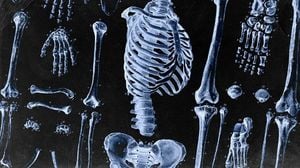The Oyo State House of Assembly has urged the state government to introduce paternity leave for its civil and private sectors, emphasizing the need to strengthen family bonds and provide additional care for newborns.
During the plenary session on Thursday, presided over by Deputy Speaker Hon. Abiodun Fadeyi, the motion was introduced by Hon. Olorunpoto Rahman, the representative for Oyo East and West State Constituency. He noted the importance of caregiver bonding, especially for newborns, and advocated for fathers to be present during the recovery phase after childbirth.
"A newborn child relies heavily on a strong bond with caregivers, typically the parents who influence their emotional, social, and cognitive growth," Hon. Rahman explained. He highlighted how paternity leave can promote gender equality and shared parental responsibilities.
Rahman pointed out the successful implementation of paternity leave policies elsewhere, stating, "Many countries and states have adopted the paternity leave policy, and it has helped in boosting morale and improving productivity, fostering family cohesion and stability." He mentioned the existence of this leave at the federal civil service level as well as its implementation in Lagos and Enugu States.
The lawmaker stressed the need for such policies, arguing the absence of paternity leave could hinder fathers’ ability to support their families effectively during the pivotal postnatal period. The House has recommended setting the duration of paternity leave at a minimum of ten working days, with fathers entitled to utilize it three times within their annual service period, ideally taking the leave within the first month following childbirth or adoption.
Meanwhile, significant transitions are occurring within the Nigerian hospitality sector. The National Institute for Hospitality and Tourism (NIHOTOUR) is progressing from being merely a training institute to acquiring regulatory authority status. Under the leadership of Director-General Aare Abisoye Fagade, this transition involves high-level courtesy visits to key government bodies, fostering collaboration aimed at enhancing industry standards.
During these visits, Fagade has engaged with top officials, including Mr. Ayodele Subair from the Lagos Internal Revenue Service and Prof. Mojisola Adeyeye of the National Agency for Food and Drug Administration and Control (NAFDAC). Discussions center around strategic partnerships to improve compliance and service delivery within the hospitality, travel, and tourism sectors. "Our vision is clear—to build a well-regulated travel, hospitality, and tourism sector..." stated Fagade.
These steps are deemed necessary to align Nigeria’s tourism sector with international best practices, marking NIHOTOUR’s commitment to excellence and innovation.
On another front, the recent withdrawal of Chief Afe Babalola’s criminal defamation suit against barrister Dele Farotimi highlights troubling intersections between traditional conflict resolution methods and contemporary legal frameworks. This incident, precipitated by interventions from traditional rulers, raises concerns over the integrity of Nigeria's legal system, especially considering the societal proclivity for false accusations.
Prof. Adekunle Oloyede and Richard Odusanya argue the significance of this occurrence for the Yoruba community and Nigerian society as a whole. They stress, "When influential figures intervene to suppress such cases, they inadvertently weaken the legal framework meant to protect reputations and encourage responsible speech." This intervention could undermine the principles of equality before the law, potentially fostering environments where public figures evade accountability.
There remains the unsettling reality of social media, wherein false and defamatory information disseminates rapidly, escaping judicial scrutiny. This era could lead to the adverse deterioration of public trust, especially if accusations against professionals, such as those in healthcare or finance, proliferate without due process. The authors articulate visible consequences when individuals misuse accusations to settle personal scores amid governmental corruption, as unchallenged assertions wreak havoc on reputations.
The authors conclude with strong advocacy for reinforcing the legal authority of the judiciary. They suggest establishing clearer laws on defamation to safeguard against baseless allegations, thereby protecting the privileging of free speech against obfuscation. Emphasizing the need for public education about legal processes, they underline the importance of judicial integrity and cultural awareness.
The juxtaposition of cultural impulses toward reconciliation against the imperatives of justice exemplifies the delicate balance Nigeria must navigate. Historical tensions between traditional practices and the modern legal regime suggest the necessity of establishing frameworks ensuring both can coexist harmoniously.
The eventual outcome of Babalola's legal retreat becomes illustrative of wider societal tendencies, and the nation's collective power to choose between communal harmony and the strict adherence to law will define Nigeria’s socio-legal future.



